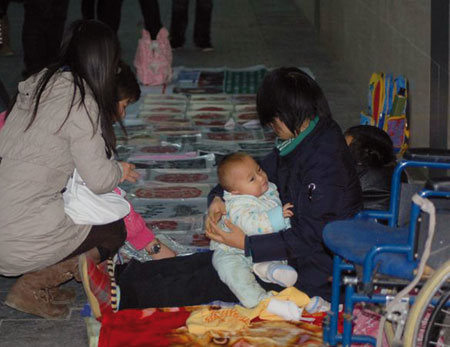Handle with care
Mending the china dolls
In all its forms, OI probably affects about 1 in every 5,000 to 10,000 individuals of all racial and ethnic origins, said Wang Yiou, founder of the China-Dolls Care & Support Association, a non-governmental organization for IO patients.
|
|
|
Zhang Yutian in an underpass close to Xizhimen subway station in January Photo: Song Shengxia |
Due to the costly treatments and ignorance as well the superstitious belief that having such children will curse a family, many china dolls are abandoned.
"We are looking for china dolls across the country. Many of them are found in orphanages," Wang said.
So far, Wang's association has found about 1,000 china dolls and helped 40 of them.
Wang found Zhang couple in the underpass last year and arranged through Beijing Children's Hospital to give them free medication worth about 10,000 yuan.
'Luckier than many'
Born a china doll herself, 28-year-old Wang, with blue eyes, typical for an IO sufferer, is no taller than a 10-year-old child.
She fractured her legs five times between the ages of 1 and 16 and had to wear a heavy brace on her right leg that forced her to hobble and brought unwanted stares and attention from strangers.
"I know how painful it is when they break their bones. I'm luckier compared to those whose condition is more serious and who might have experienced dozens of fractures in their childhood," she said.
After a successful surgery at 18, Wang got rid of the brace and went to college. She founded her association in 2008 and raised 360,000 yuan by the end of 2009, most of which was donated by individuals.
"The biggest challenges are lack of funds, medicine supplies, ignorance and absence of legislation to help the patients with rare diseases," Wang said.
Rare diseases such as OI are a universal medical problem around the world. So far, more than 6,000 rare diseases caused by gene mutations have been identified, according to the World Health Organization.
Drugs treating rare diseases are in short supply because pharmaceutical industry has little interest in developing and marketing products targeting small markets that would not generate huge profits. So these drugs are called "orphan drugs," referring to their availability and a lack of resources.
Few of these diseases are covered under medical insurance or commercial insurance systems.
But many Western countries have laws in place to provide financial incentives to encourage development of new treatments for rare diseases in China.
In the United States, the Orphan Drug Act was passed in 1983 to provide tax credits for the cost of clinical research and grants to support research on new treatments for rare diseases. Most importantly, it promises seven years of exclusive marketing for sponsors of designated orphan drugs.
But there is no such legislation in China. Most of sufferers are also deprived of education and employment opportunities.
 0
0 








Go to Forum >>0 Comments